Fast blue optical transient
In astronomy, a fast blue optical transient (FBOT), or technically, luminous fast blue optical transients (LFBOT), is an explosion event similar to supernovas and Gamma-ray bursts which presents high optical luminosity between those but rises and decays faster and has its spectra concentrated on the blue range.[1] It is caused by some very high-energy astrophysical process not yet understood but thought to be a type of supernova with events occurring at not more than 0.1% of the typical rate.[2]
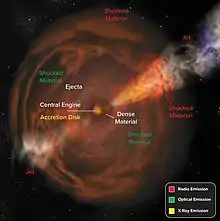
Illustration of a FBOT
List
| Transient | Reported | Date | Observatory | Notes |
|---|---|---|---|---|
| AT2018cow[3][4][5] | 2018 | June 16, 2018 | ATLAS-HKO | "The Cow"
Peak luminosity , exceeding that of superluminous supernovae |
| ZTF18abvkwla | 2020 | September 12, 2018 | Zwicky Transient Facility | "The Koala"
Temperature over 40,000 Kelvin |
| CSS161010[7][8] | 2020 | October 10, 2016 | CRTS | Mass outflows at 55% the speed of light |
| AT2020xnd (ZTF20acigmel)[9][10] | 2021 | October 12, 2020 | Zwicky Transient Facility | "The Camel" |
| AT2020mrf[11][12] | 2022 | June 12, 2020 | Spektr-RG, Zwicky Transient Facility | 200 times more luminous on the X-ray spectrum at its peak than AT2018cow and CSS161010 |
| AT2022tsd[13][14] | 2023 | September 7, 2022 | Zwicky Transient Facility | "The Tasmanian Devil" |
| AT2023fhn[15][14][16][17] | 2023 | April 10, 2023 | Zwicky Transient Facility | "The Finch" or "The Fawn" |
 Comparison between Supernova (SN), Gamma-ray burst (GRB) and Fast blue optical transient (FBOT)
Comparison between Supernova (SN), Gamma-ray burst (GRB) and Fast blue optical transient (FBOT)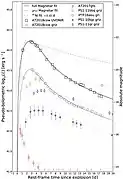 Bolometric luminosity of AT2018cow with a very fast and high peak[4]
Bolometric luminosity of AT2018cow with a very fast and high peak[4]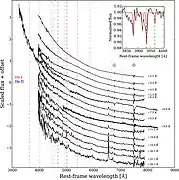
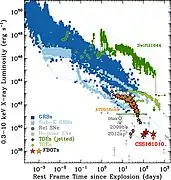 Luminosity of FBOTs compared with other astronomical transients[7]
Luminosity of FBOTs compared with other astronomical transients[7]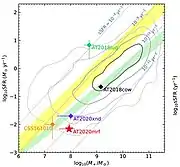 Star formation rate diagram for FBOTs.[11]
Star formation rate diagram for FBOTs.[11]
References
- O"Callaghan, Jonathan (19 July 2023). "A Cow, a Camel and a Finch Exploded in Space. What Is Going On? - Astronomers have yet to determine the cause of luminous fast blue optical transients, and the latest they have detected is raising even more questions". The New York Times. Archived from the original on 20 July 2023. Retrieved 19 July 2023.
- Ho, Anna Y. Q.; Perley, Daniel A.; Kulkarni, S. R.; Dong, Dillon Z. J.; De, Kishalay; Chandra, Poonam; Andreoni, Igor; Bellm, Eric C.; Burdge, Kevin B.; Coughlin, Michael; Dekany, Richard (26 May 2020). "The Koala: A Fast Blue Optical Transient with Luminous Radio Emission from a Starburst Dwarf Galaxy atz= 0.27". The Astrophysical Journal. 895 (1): 49. arXiv:2003.01222. Bibcode:2020ApJ...895...49H. doi:10.3847/1538-4357/ab8bcf. ISSN 1538-4357. S2CID 211817823.
- Smartt, S. J.; et al. (17 June 2018). "ATLAS18qqn (AT2018cow) - a bright transient spatially coincident with CGCG 137-068 (60 Mpc)". The Astronomer's Telegram. 11727 (11727): 1. Bibcode:2018ATel11727....1S. Retrieved 22 June 2018.
- Prentice, S. J.; Maguire, K.; Smartt, S. J.; Magee, M. R.; Schady, P.; Sim, S.; Chen, T.-W.; Clark, P.; Colin, C.; Fulton, M.; McBrien, O. (17 September 2018). "The Cow: Discovery of a Luminous, Hot, and Rapidly Evolving Transient". The Astrophysical Journal. 865 (1): L3. arXiv:1807.05965. Bibcode:2018ApJ...865L...3P. doi:10.3847/2041-8213/aadd90. ISSN 2041-8213. S2CID 54703801.
- Castelvecchi, Davide (2 November 2018). "Holy Cow! Astronomers agog at mysterious new supernova". Nature. 563 (7730): 168–169. Bibcode:2018Natur.563..168C. doi:10.1038/d41586-018-07260-w. PMID 30401847. S2CID 53233136.
- "A Fast, Blue "Koala" Shines Bright in a Distant Galaxy". 15 May 2020. Retrieved 16 January 2022.
- Coppejans, D. L.; Margutti, R.; Terreran, G.; Nayana, A. J.; Coughlin, E. R.; Laskar, T.; Alexander, K. D.; Bietenholz, M.; Caprioli, D.; Chandra, P.; Drout, M. R. (26 May 2020). "A Mildly Relativistic Outflow from the Energetic, Fast-rising Blue Optical Transient CSS161010 in a Dwarf Galaxy". The Astrophysical Journal. 895 (1): L23. arXiv:2003.10503. Bibcode:2020ApJ...895L..23C. doi:10.3847/2041-8213/ab8cc7. ISSN 2041-8213. S2CID 214623364.
- "Astrophysicists capture new class of transient objects". news.northwestern.edu. Retrieved 15 January 2022.
- Perley, Daniel A; Ho, Anna Y Q; Yao, Yuhan; Fremling, Christoffer; Anderson, Joseph P; Schulze, Steve; Kumar, Harsh; Anupama, G C; Barway, Sudhanshu; Bellm, Eric C; Bhalerao, Varun (27 October 2021). "Real-time discovery of AT2020xnd: a fast, luminous ultraviolet transient with minimal radioactive ejecta". Monthly Notices of the Royal Astronomical Society. 508 (4): 5138–5147. arXiv:2103.01968. doi:10.1093/mnras/stab2785. ISSN 0035-8711.
- O'Callaghan, Jonathan (10 March 2021). "New Kind of Space Explosion Reveals the Birth of a Black Hole". Quanta Magazine. Retrieved 16 January 2022.
- Yao, Yuhan; Ho, Anna Y. Q.; Medvedev, Pavel; A. J., Nayana; Perley, Daniel A.; Kulkarni, S. R.; Chandra, Poonam; Sazonov, Sergey; Gilfanov, Marat; Khorunzhev, Georgii; Khatami, David K.; Sunyaev, Rashid (1 August 2022). "The X-Ray and Radio Loud Fast Blue Optical Transient AT2020mrf: Implications for an Emerging Class of Engine-driven Massive Star Explosions". The Astrophysical Journal. 934 (2): 104. arXiv:2112.00751. Bibcode:2022ApJ...934..104Y. doi:10.3847/1538-4357/ac7a41. ISSN 0004-637X. S2CID 244798769.
- "Astronomers Find Most Luminous "Cow" to Shine in X-Rays". California Institute of Technology. 10 January 2022. Retrieved 15 January 2022.
- Matthews, D.; Margutti, R.; Metzger, B. D.; Milisavljevic, D.; Migliori, G.; Laskar, T.; Brethauer, D.; Berger, E.; Chornock, R.; Drout, M.; Ramirez-Ruiz, E. (19 June 2023). "Unprecedented X-Ray Emission from the Fast Blue Optical Transient AT2022tsd". Research Notes of the AAS. 7 (6): 126. arXiv:2306.01114. Bibcode:2023RNAAS...7..126M. doi:10.3847/2515-5172/acdde1. ISSN 2515-5172.
- O’Callaghan, Jonathan (19 July 2023). "A Cow, a Camel and a Finch Exploded in Space. What Is Going On?". The New York Times. ISSN 0362-4331. Retrieved 30 August 2023.
- Chrimes, A. A.; Jonker, P. G.; Levan, A. J.; Coppejans, D. L.; Gaspari, N.; Gompertz, B. P.; Groot, P. J.; Malesani, D. B.; Mummery, A.; Stanway, E. R.; Wiersema, K. (2023). "AT2023fhn (the Finch): a Luminous Fast Blue Optical Transient at a large offset from its host galaxy". arXiv:2307.01771 [astro-ph.HE].
- Panjkov, Sonja (21 July 2023). "Luminous, Fast and Blue: Do the Finch and the Cow Share a Common Ancestor?". Astrobites.
- Cooper, Keith (6 October 2023). "Hubble Telescope just witnessed a massive intergalactic explosion and astronomers can't explain it - The leading theories involve stars being ripped apart by black holes or the merger of neutron stars". Space.com. Archived from the original on 6 October 2023. Retrieved 7 October 2023.
External links
This article is issued from Wikipedia. The text is licensed under Creative Commons - Attribution - Sharealike. Additional terms may apply for the media files.

